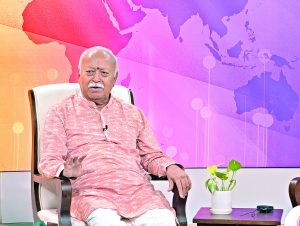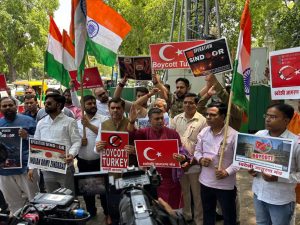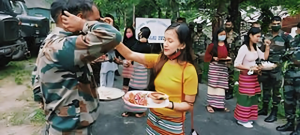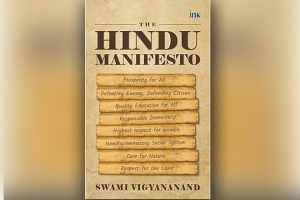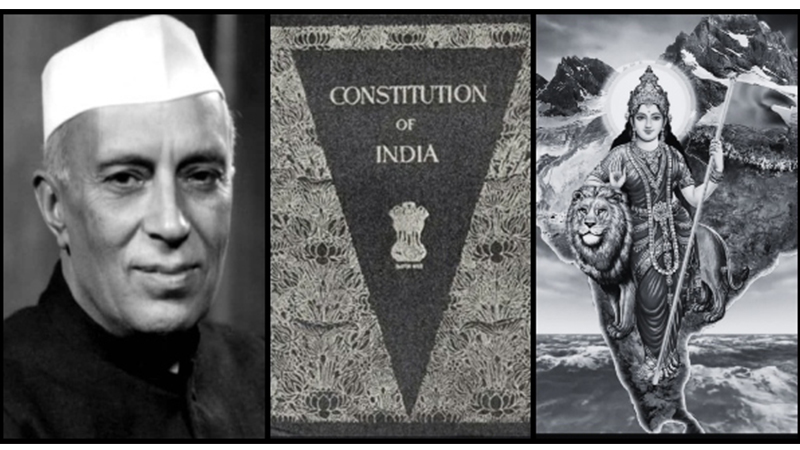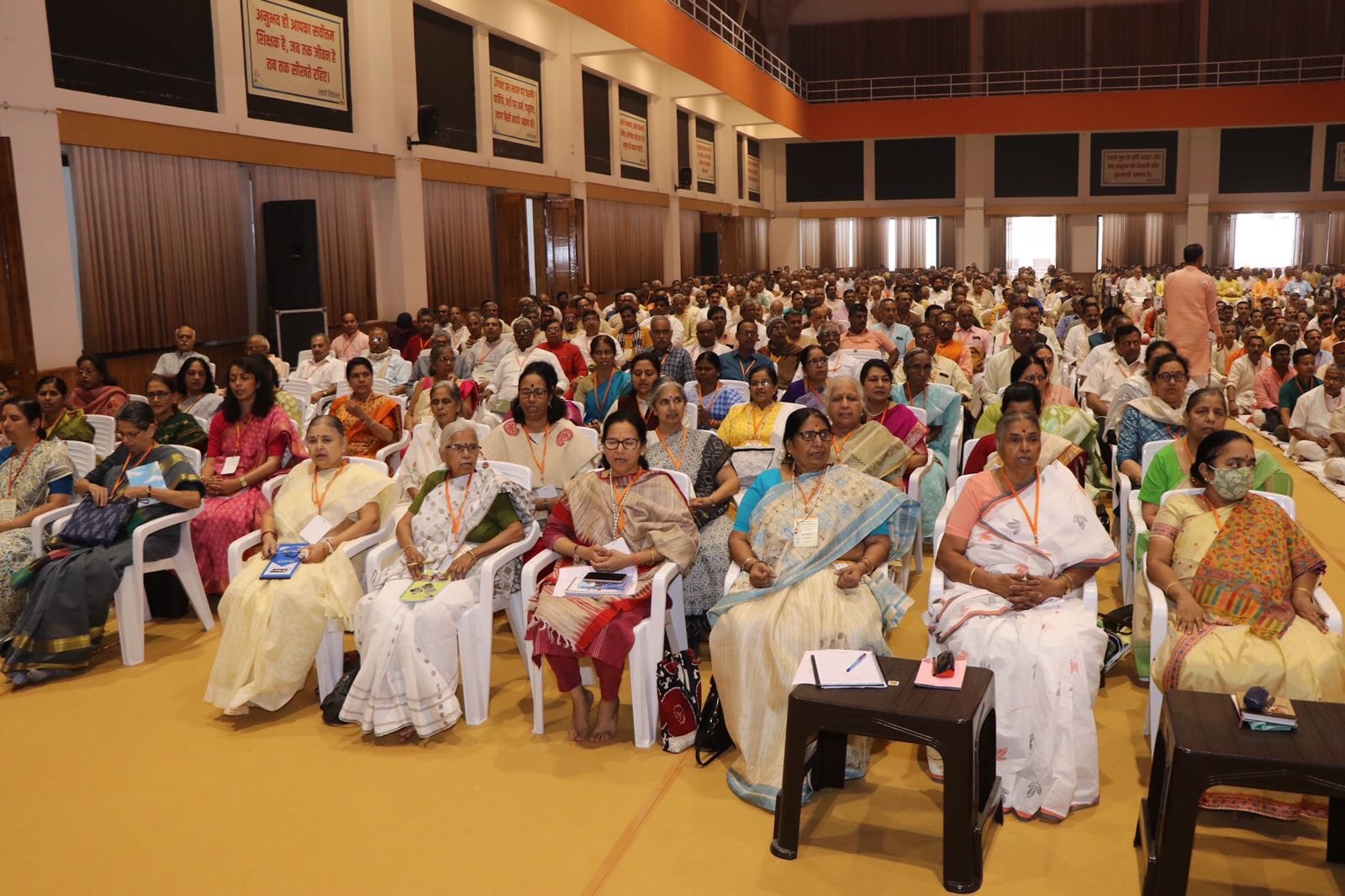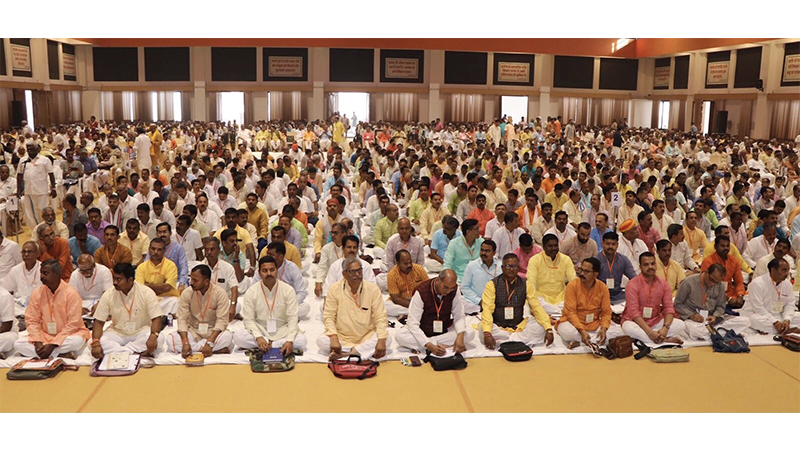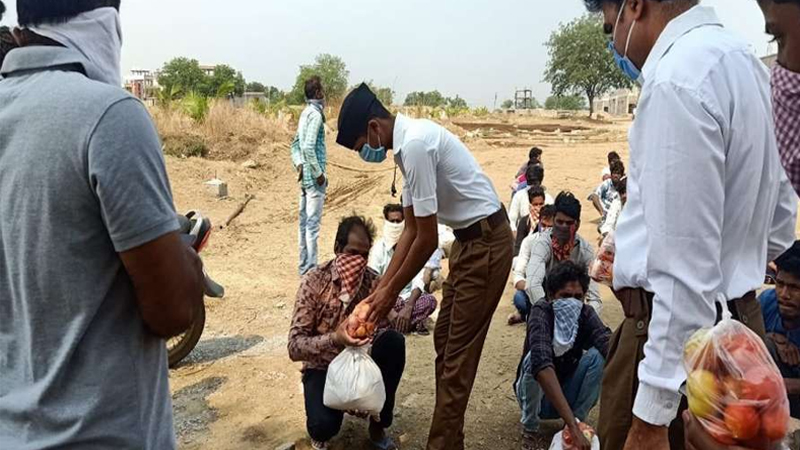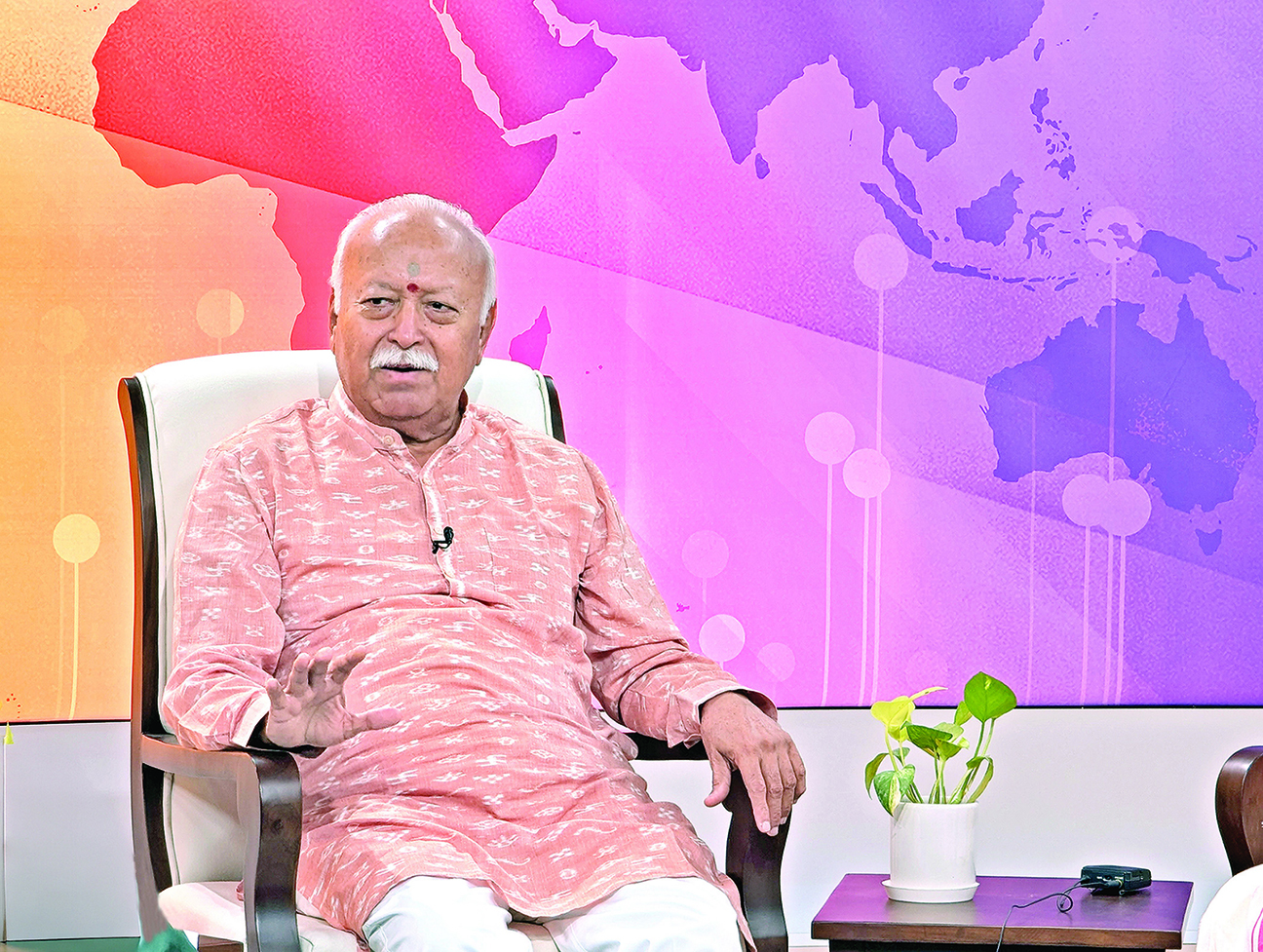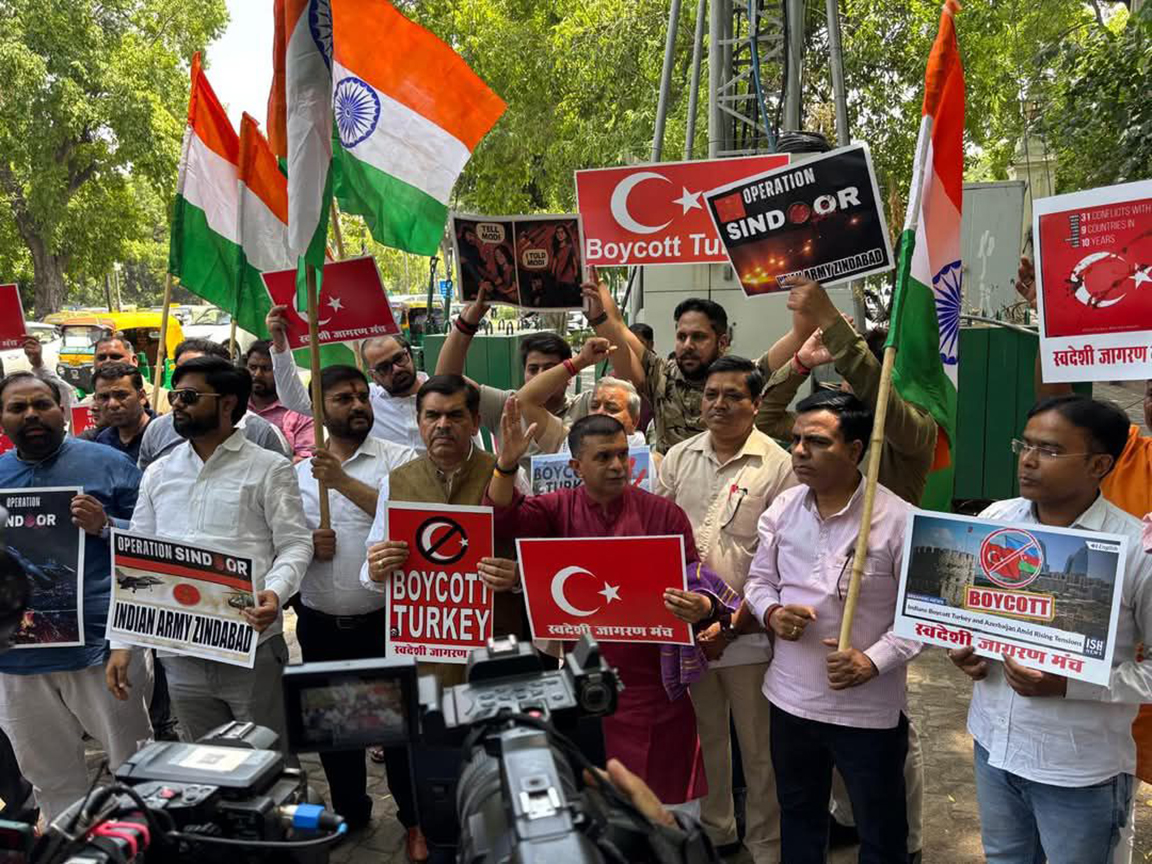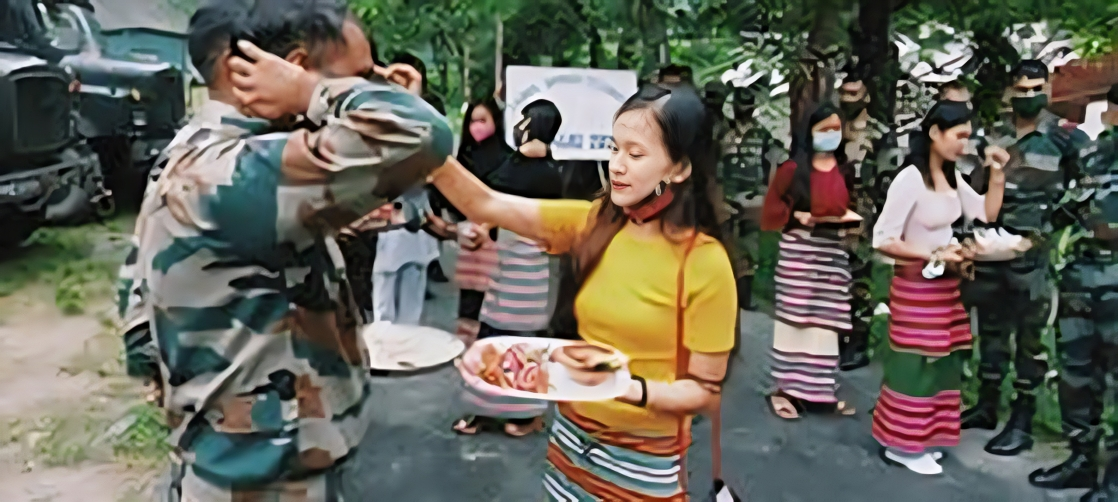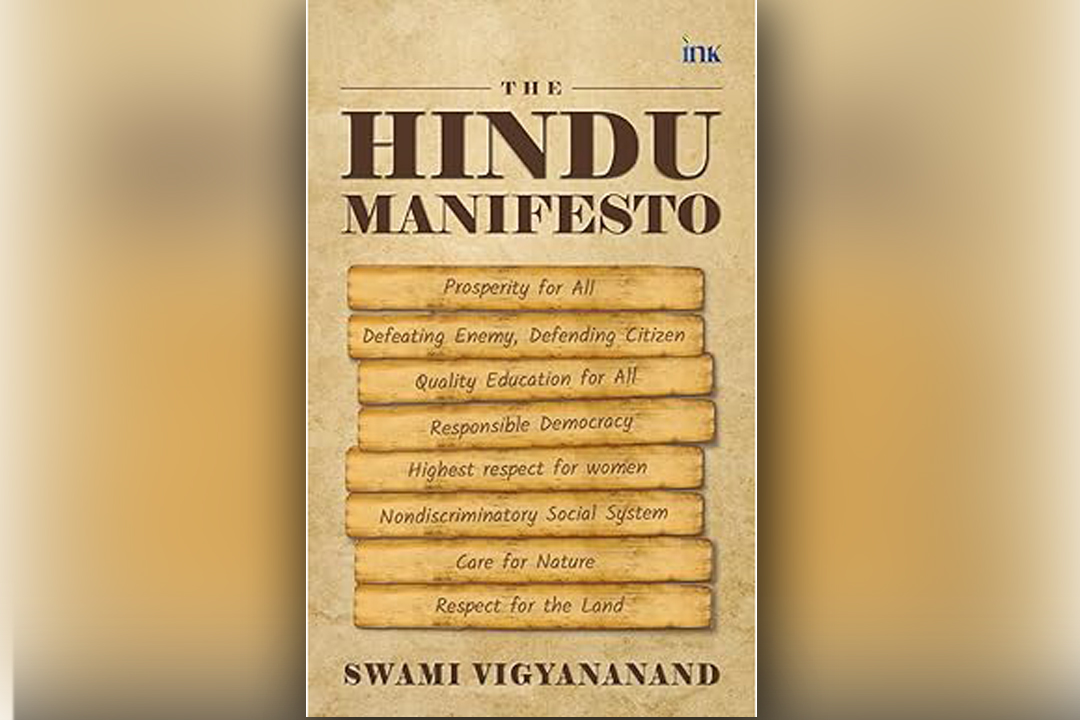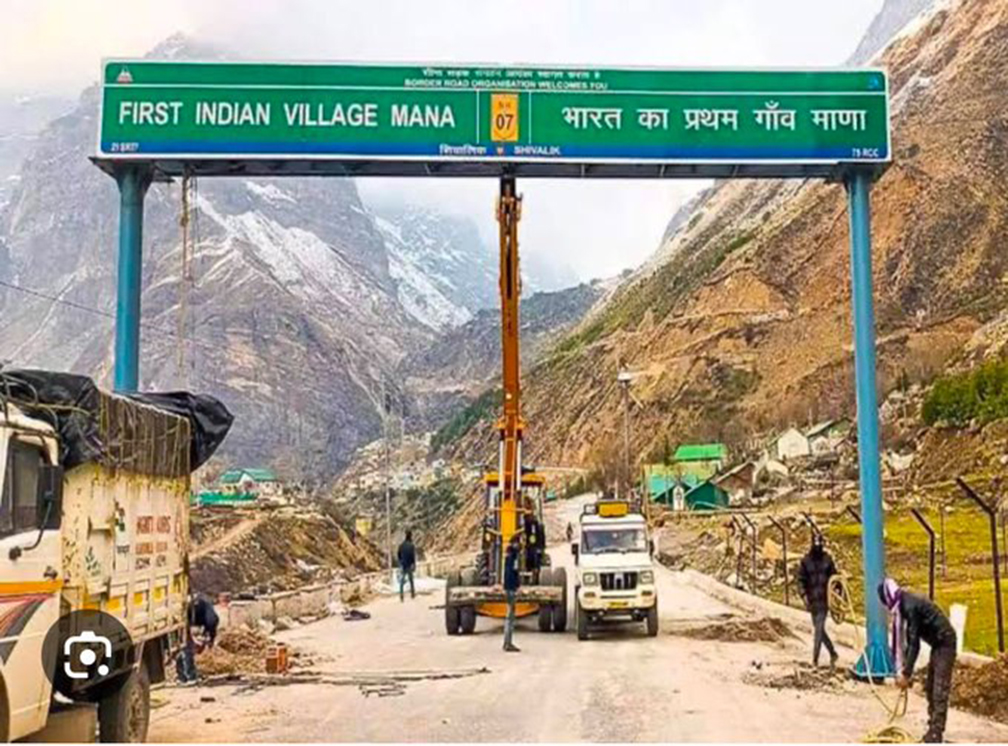Understanding growth of RSS from 2014 to 2023 through its Annual Reports
Updated: September 5, 2023 4:04
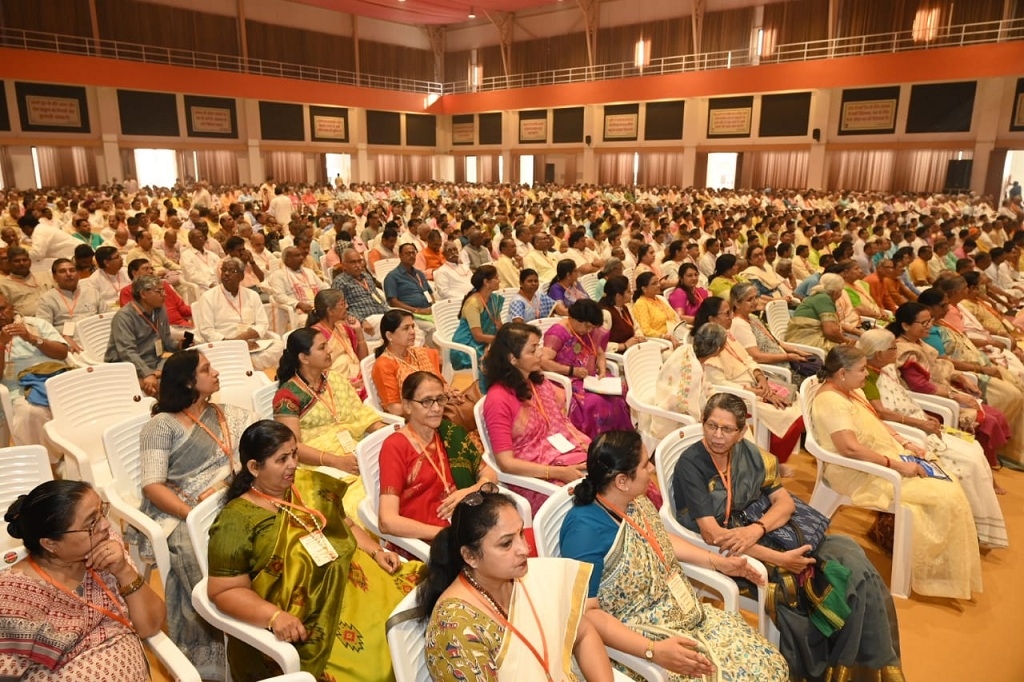
Akhil Bharatiya Pratinidhi Sabha (ABPS) is the top decision-making body of the Rashtriya Swayamsevak Sangh (RSS). It meets once in a year for around three days. It has more than 1000 members which come as delegates from all over the country. The General Secretary of the RSS, known officially as Sarkaryavah, presents a report detailing the activities and reach of the organization. We are sharing here excerpts from last few years annual reports that can help one to understand the growth and evolution of the RSS over the last one decade.
ABPS REPORT 2022-23
During 2022-23, Rashtriya Swayamsewak Sangh (RSS) Sarsanghchalak (Chief Mentor) Mohan Bhagwat met many prominent personalities including Wipro chairman Azim Premji, Mafatlal group’s Vishad Mafatlal, nephew of Netaji Subhash Chandra Bose Ardhendu Bose, nephew of Lata Mangeshkar and singer Adinath Mangeshkar and chief Imam Maulana Umar Ilyasi. The RSS chief held special meetings with actor Akshay Kumar, singer Rashid Khan, sportsperson PT Usha, cricketer Ravinder Jadeja and Acharya Balakrishnan of Patanjali Yoga Peeth. He also sought blessings from Mata Amritanandamayi “Amma” in Kerela, Jain monk Ratnasunder Suriji Maharaj in Ahmedabad and Madarchennaya Swamiji of Chitragurda mutt in Karnataka. (Pg 6)
Over 8,500 new ‘shakha’ (daily meetings) were started by the RSS in the country during 2022-23. The total number of ‘shakha’ rose up 12 per cent to 68,651 from 60,117 during the previous year. Around 4,700 new locations were added to the existing 37,903 compared to the year-ago period, an increase of 11 per cent, to carry out its activities and organisational work. The number of weekly and monthly get-togethers rose by over 20 per cent. This comprised of 26877 ‘saptahik milan’ (weekly get-togethers) and 10,412 ‘sangh mandali’(monthly gatherings). (Pg 4 bar graph)
With its centenary year approaching, the RSS feels the need to start working with a renewed focus on ensuring social harmony, family values, environment conservation, Indian way of living and civic duties. (Pg 32)
As part of the Sangh’s efforts to expand its footprints, ‘vistaraks’ (workers focusing specifically on expansion of the organisation) were appointed on short-term basis to help open shakhas in new areas. They have been tasked with the opening of new shakhas in ‘mandals’ (comprising 7-8 villages) and ‘bastis’ (colonies in urban areas), which are currently without it. (Pg 37) In Karnataka West alone, over one lakh houses were contacted till November with the help of 355 newly inducted short-term ‘vistaraks’.
A survey of 13,575 villages was carried out with a view to end discrimination involving entry into temples, and access to water sources and common creamation ground for the people of every community. To ensure social harmony, a reform action plan is being drawn for the places where the cases of discrimination have been reported. (Pg 22)
As many as 1.5 lakh families were contacted by ‘kutumb mitra’( friends of families), the workers of the ‘ kutumb prabodhan’ wing (an RSS wing that works for promoting family values) wing, through its various programmes, relating to awakening of family values, during the last one year. Training and orientation programmes focusing on topics such as daily routine, educational books, games, music, diet and health were held for the workers. It also included-how to lead a virtuous life, and resolve tension and disputes in family life. (Pg 49) Around 36,000 RSS workers in 47 ‘prants’(provinces) participated in ‘Go Sewa’ (Cow welfare)activities. As many as 7,600 ‘goshaalas‘ (cow shelters) are currently being run by the Sangh. The report puts the number of desi (indigenous breed) cows in the country at 2.15 lakh across 80,000 cow-rearing households. Some 2,500 families are involved in cow-based agricultural practices, covering an area of over 42,000 acre. Over 2,50,000 ‘diyas’ (earthen lamps) were made during Diwali (an Indian festival) using cow dung, lighting up 0.56 million homes. Cow science tests were conducted at 88 places in which around 0.12 million students took part. (Pg 19)
Under the village development initiative, 7 villages in Kerala were declared free from loan, alcohol addiction and crime. Farmer Producer Organisations (FPOs) were set up in 15 ‘sankuls’ (building complexes). The area under organic farming witnessed an increase. Self employment opportunities such as achaar (pickle), murabba( a kind of Indian marmalade) making, and sewing helped women augment their incomes. In Haridwar (in the state of Uttarakhand), a large number of women got employment in mushroom farming under ‘ek zila ek utpad’ (one district one produce) scheme. Similarly, many landless farmers took to mushroom farming and beekeeping. In Chittor’s Jhalawar district ( in the state of Rajasthan), each family in a village got employment through the opening of 79 shops and ‘goshalas’ (cow shelters). Nearly 2,500 people were provided loans through 12 ‘bachat samities’(saving committees). (Pg 20)
Several ecological conservation initiatives were undertaken during the year. In Bengaluru, three ponds were revived. Tree plantation and water literacy drives were initiated in the city. Environment-friendly ‘chulhas’ (stoves) were set up and compost-making process was introduced in some of the city households. Polythene-free Gawalior (in the state of Madhya Pradesh) campaign was undertaken with 1,50,000 people shunning poly bags. Cloth bags made of old sarees were distributed in Sangali town of West Maharashtra. In Ujjain, as part of the Kshipra river conservation drive, tree plantation and pond construction work has been planned and public awareness is being created in this regard. In Punjab’s Amritsar district, ‘plants langar’(mass sowing of plants) was organised during ‘haryawal mela’ (a popular local fair). (Pg 23)
A total of 10,799 RSS workers contributed to ‘sampark vibhag’ (Outreach department) to carry out activities ranging from organising seminars to improving women’s participation in its various programmes. Similarly, dialogues were held between well-known people of the area and the RSS top functionaries. Many of these prominent personalities were also roped in the ongoing social work of the Sangh.(Pg 17) Meanwhile, the publicity initiatives included informal interactions with the editors and the state correspondents of various Indian newspapers as well with the foreign journalists. About 50 columnists attended a meeting held to discuss a variety of issues. As many as 69 social media influencers participated in a separate meeting presided over by Sah Sarkaryawah(joint general secretaries) Dr Manmohan Vaidya and Arun Kumar. (Pg 18)
ABPS Report: 2021-2022
During 2021-22, a total of 60,929 ‘shakhas’ were held by the RSS at 38,390 places in the country, as per the latest
annual report of the Akhil Bhartiya Pratinidhi Sabha (ABPS).
The daily meetings involves physical exercises, singing patriotic songs, group discussions and a prayer for motherland. The number of ‘shakha’ and the designated places for the daily meeting went up by 10 per cent as compared to the previous year.
- During 2020-21, the number of ‘shakha’ and ‘shakha’ places stood at 55,652 and 34,569 Similarly, 20,681 ‘saptahik milan’ (weekly meetings) and 7,923 ‘sangh mandali’ (monthly meetings) were organised during 2021-22, an increase of 10 per cent and 3 per cent respectively over the previous year. In the year-ago period, 18,553 ‘saptahik milan’ and 7655 ‘sangh mandali’ were organised. (Pg 4)
- SarSanghchalak Mohan Bhagwat met and took blessings of Tibetan spiritual guru Dalai Lama, Shankaracharya of Puri Nishchalanand Saraswati and Acharya Vijay Abhaydev of Surat. He also met sarod mastero Ustad Amjad Ali Khan, Rajasthani folk singer Anwar Khan, renowned educationist from Odisha Rajat Kar and well-known sand artist Sudersan Various organisational meetings were presided over by the RSS chief mentor during his stay in 19 ‘prants’(provinces), including Haryana, Gujarat, Delhi, Kanpur, Jaipur, Telangana, Uttar Bihar, Uttar Assam, Karnataka Dakshin and Madhya Bharat. Lectures were delivered in 7 big cities on 4 topics-‘aarthik chintan’ (introspection on economic issues), ‘hindu chintan aur drishti’ ( Introspection and deliberations on Hindu view of life), ‘prakriti, paryavaran’ (nature, environment), and ‘mahila, jivan mulya sanrakshan’ ( conserving life values of women). (Pg 6)
- He also chaired meetings of ‘sampark vibhag’ (public relations department) and ‘prachar vibhag’ (publicity department) during the year. The meetings were organised by ‘sampark vibhag’ with the retired judges, administrative services officers and senior army officials at various places. ‘Prachar vibhag’ held separate meetings with the heads of the institutes of media, films and publications in Delhi during September and October, 2021. A meeting with the editors of the print and the electronic media took place at Karnataka’s Bhagyanagar on January 18, 2022. Another such meeting was attended by the directors of Telugu film (Pg 9)
- Sangh’s ‘sewa vibhag’(social service wing) decided to take up development of 9,953 ‘sewa bastis’(marginalized colonies)’. The RSS volunteers provided services to the members of the disadvantaged sections of the society. A total of 28,866 sewa projects were undertaken during the year. During the third wave of Covid, the workers made efforts to ensure the availability of blood to the patients at several places. The RSS made special efforts to help people, particularly the members of the nomadic tribes in Rajasthan by making available food and health facilities to them. (Pg 8)
- Efforts were made to help people cope with the impact of Covid-19 on studies, employment and families. Free classes were held for the students of ‘sewa bastis’ (marginalized habitats) and also at other places. Students’ educational journey was impacted due closure of schools during Covid. Similarly, people lost their jobs. Small employment and training opportunities were created by the RSS volunteers to help people and families in crisis. It was felt that a lot more was needed to be done in these The focus would be on developing handicrafts, cottage and small industries, and agriculture in rural areas. (Pg 21)
- A total of 30,525 workers, including 13,479 in the villages, are involved in the ‘go sewa’ activities in the An area of 29,749 acre is being cultivated by 9,129 families using cow-based agricultural practices. The population of desi cows has reached close to 2 lakh. As many as 68,693 families are rearing ‘desi’ (indigenous breed) cows, while 9,281 families use ‘gobar’ (cow dung) gas for fuel for cooking. Around 1,300 workers are involved in the manufacturing and sale of cow-related products. Around 1.8 lakh Ganesh idols and 34 lakh Diwali ‘diyas’ (lamps) were made using cow dung. (Pg 10)
Over 5.4 lakh members belonging to Kaneri Matt, Gayatri Parivar, Patanjali, Ramchandra Mission, Ramakrishna Mission, ISKCON, as well as farmers took part in the activities organised under the ‘bhumi suposhan abhiyan’ (land nutrition campaign) at around 18,000 places. (Pg 10)
Under ‘kutumb prabodhan’, 45 coordinators were appointed to take the message of public welfare to the people. They will be stressing on the importance of inculcating values first at the family level. The ‘mantra’ to have a happy home and keep away tension, fights, pressures is by facilitating dialogue in the family. (Pg 11)
As part of its activities aimed at conserving environment, nearly 8.5 lakh children from 55,000 schools participated in the national environment competition held in January, 2022. Around 150 students were selected, from among 55,000 participants from 155 universities, to take part in the National Environment Youth Parliament. Meanwhile, ‘Eco Mitram’ app was developed as part of the environment conservation activities. The app has been downloaded by 7.6 lakh people so far. (Pg 12)
The report cautioned against a malicious agenda being spread by a particular community and its efforts to further it by planning to enter the government machinery. It further noted that there’s a growing religious fanaticism, and communal hysteria being spread in the country under the guise of Constitution and religious freedom. The brutal murders of activists of Hindu organisations in Kerela and Karnataka pointed towards it. With the census year approaching, there had been instances of inciting groups saying that they were not Hindus, the report said. Malicious agenda seemed to be at work in the country and abroad under the intellectual garb, the report further added. The ABPS report called upon ‘swayamsewaks’ to make the activities of ‘jagran shreni’ and ‘gatividhis’ more result-oriented, and also activate the dormant power of the workers to deal with the situation and to expand the organisational work, in the run-up to the RSS’s centenary year in 2025. (Pg 23)
Ends
ABPS 2018-19 report
During 2018-19, the number of daily classes or ‘shakha’ run by Rashtriya Swayamsewak Sangh (RSS) increased to 59,266, compared to 58,967 in the previous year, according to the annual report of the Sangh. The report was presented on March 8, 2019, during the three-day annual meeting of Akhil Bhartiya Pratinidhi Sabha (ABPS), the highest decision-making body of the RSS, held in Gwalior. The daily gathering of volunteers known as ‘shakha’, where volunteers perform physical fitness exercises, prayers etc, were held at 37,011 places, marginally down from 37,190 in the previous year. The shakha is generally held in a ground. A total of 17,229 ‘saptahik milan’ (weekly meetings) and 8,382 ‘masik milan’ (monthly meetings) were organised by the RSS during 2018-19 as compared to 16,405 and 7,976 meetings held respectively during the previous year.
RSS Sarsanghchalak Mohan Bhagwat held meetings with the prominent personalities and religious gurus during the year during the year. He met with ISRO chairman K Sivan, scientist CNR Rao, former Chief Justice of Karnataka High Court SK Mukherjee, founder chairman of Apollo Hospitals Dr Prathap C Reddy, Piramal group’s Ajay Piramal and SK Lakhani of Lakhani shoes company. The RSS chief took blessings from Hira Sinh ji Maharaj, Devrah Baba, Narendracharya Maharaj of Nanijdham, Nimbarkacharya Swamiji Maharaj, Chittranjanji Maharaj of Shanti Kali Mission, Agartala, Shankarachary Vijayerndra Sarasvati of Kanchi Kamkoti math and Thakur Ashok Da of Satsang Aashram,
Deoghar. A three-day first of its kind lecture series on ‘Bharat of Future-the viewpoint of Rashtriya Swayamsewak Sangh’ by the RSS chief was organised in the national capital. He addressed another mega event, World Hindu Congress 2018, held by the RSS in Chicago to commemorate 125 years of Swami Vivekananda historic Chicago address.
The report termed the Supreme Court’s stand on Ram-Janambhoomi case as “surprising”. “Instead of accelerating the judicial process to end the long drawn dispute, the SC has taken a surprising stand. And that the SC should find no priority for this sensitive subject associated with deep faith of Hindu society is beyond understanding,” the report said, adding that the Hindus are constantly being neglected. “While having full respect in the judicial system we would like to say emphatically that the judgment on the dispute must expedite and remove the obstacles in constructing a grand temple,” the report added.
On Sabarimala case, the ABPS report said, “the Supreme Court without taking into consideration all relevant entities and customs, delivered a judgment even without consideration of the different opinion of the lone woman member of the bench.” The report criticised the Kerela government for showing “undue haste (in implementing the decision) and political ill-will towards the Hindu society by facilitating forcible entry of non-Hindu and non-devotee women in the temple.”
With Lok Sabha elections barely a few months away, the ABPS meeting stressed on the need to create awareness about casting votes. “It’s necessary to have 100 per cent voters exercise their constitutional right to cast vote,” the report said. “The development of nation and safeguarding its pride is possible only in the hands of a group which is honest and committed to the national interest. Therefore, our national duty to be alert and to discharge the responsibility,” the report said further.
ABPS report 2017-18
The ABPS expresses satisfaction over the growing acceptability of the work being carried out by the Rashtriya Swayamsevak Sangh (RSS), particularly in the North East states. “Hindu sammelans organised in the Northeastern states, especially in Tripura, were inspirational in many ways,” the report says, adding that the admiration expressed by eminent personalities from social, religious, industrial fields indicates the increasing acceptability of the Sangh’s work. The report talks about the growing trust of people in the RSS as well as expectations from it throughout the country.
Expressing “grave concern” over the incidents of internal strife, the ABPS condemns the violence and the damage caused to public property in such a situation. The priority should be given to resolve the problems and to create an amicable and healthy environment. One also needs to be careful about the divisive forces at work in such cases, the report cautions. On the issue of “collective outrage” as a consequence of the incidents hurting the social sentiments, the ABPS says that the concerned groups need to keep in mind that their actions do not offend social pride and popular sentiments. In such situations, the constructive role of religious, social and political leadership becomes crucial. As we face a situation where “many active forces are working to create divisions and spread confusion”, the answer lies in “moving forward with persistence and hard work” and to “let the Sangh work become goal of our life,” the report says.
ABPS also reminds the participants that they have “every right to present their views within the constitutional and legal system”. While underlining the need to adhere to the restrictions, the report says, “it should be our concern that respect and confidence towards justice and security system is not broken”.
During 2017-18, a total of 58,967 ‘shakha’ or physical classes have been held at 37,190 locations, as compared to 57,165 classes organised at 36,729 places during the previous year. As many as 16,405 ‘milan’ (weekly meetings) and 7,976 ‘mandli’ (monthly meetings) have been held during the year, compared to 14,986 and 7,594 meetings respectively during the previous year.
During the year, 5,849 workers have been trained under 232 training programmes organised as part of the ‘go-sewa’ activities. Over 18,000 farmers have been given training in the techniques of organic farming. The RSS has been in touch with about 1,500 ‘goshalas’ all over the country, as per the ABPS report.
The report gives a glimpse of Sir Sanghchalak Mohan Bhagwat’s meetings with the prominent personalities during the year. He met president Ramnath Kovind and also interacted with many well-known people from different walks of life, including GMR group’s GM Rao, music maestro Rashid Khan, actor Ajay Devgan, BJP politician and former football player Kalyan Chaube during 2017-18. The RSS chief also met with Ramkrishna Math president Swami, Isha Foundation’s Sadguru Jaggi Vasudev, Bohra community guru in Mumbai Syedana Saheb, and Hans Foundation’s Bholeji Maharaj and Mangala Mataji.
Ends
ABPS report 2016-17
The Rashtriya Swayamsewak Sangh (RSS) in its annual report has blamed the West Bengal and the Kerala government for attacks on Hindus. According to the RSS’s annual report 2016-17 presented at the meeting of its top decision-making body, the Akhil Bhartiya Pratinidhi Sabha (ABPS), “the attempts are being made to terrorise Hindu society by resorting to violence. The challenges are being posed before the supporters of other thoughts by way of political intolerance and use of force.” Condemning the “gory attacks on Hindus” in West Bengal’s Malda and Dhulagarh, the RSS calls for a need to look at all such happenings with seriousness. “West Bengal, which remained victim of Left violence for years, was yearning for a better change following the ouster of the Leftists from the seat of power. But ever since the transformation of power, the attacks on Hindu society have increased in the most serious manner,” as per the report. “The naked appeasement of Muslims by those in power, and administration remaining mute spectator, reminded the events of the past,” the report adds. The RSS has questioned the “suspicious and doubtful” role of the public representatives belonging to the ruling party. Similarly, terming the situation in Kerala as worrisome, the report says that after the Leftists’ victory at the assembly elections, there has been a sudden rise in the attacks on activists associated with the RSS-inspired organisations. Slamming the state governments for their role, the report says, “it is expected that the governments in both these states would take action to ensure just behaviour and create an atmosphere of peace and harmony.”
Welcoming the central government’s decision to demonetise high-value currency notes, the RSS has called it a bold move taken to curb black money, fake currency and terrorism. “We have witnessed a different Bharat after this move. It is true that common people faced some difficulties and that was most natural, but they have shown immense restraint, patience and patriotism, which is commendable. The move….was in the right direction and must be welcomed and lauded,” the report says.
On the issue of surgical strikes, the RSS lauds the central government for indicating “strong willpower and also
successfully turning the global opinion against Pakistan resulting in cancellation of SAARC conference due to be held in Islamabad.” The report criticizes Pakistan for “indulging in proxy war against Bharat forcing the government to go in for a surgical strike in September. In conducting this strike, the government of Bharat has used its strategic expertise to the highest possible level so that the Bhartiya soldiers returned successfully after completely destroying terrorist hideouts inside the Pakistan border.” It says that instead of controlling anti-India activities by giving shelter to anti-Bharat forces, strengthening them and continuing firing at the border, Pakistan has been indulging in proxy war against Bharat forcing the government to go in for surgical strike in September. Blaming Pakistan for vitiating the atmosphere, the RSS says, “there are other countries that are creating hurdles in way of India becoming a strong and vibrant global power.” Congratulating Indian Space Research Organisation (ISRO) scientists for creating a new world record, the RSS says, “the Bhartiya scientists deserve special credit for launching 104 satellites in just 30 minutes into the orbit successfully.” The number of ‘shakha’ or physical activity classes stood at 57,233 during 2016-17, compared to 56,569 classes held in the previous year. The ‘shakhas’ were held at 36,693 locations during 2016-17 as compared to 36,867 in the year-ago period. Similarly, 14,650 ‘milan’ or weekly meetings and 7,790 ‘mandali’ or monthly meetings were held during 2016-17, against 13,784 weekly and 8,226 monthly meetings held in the previous year.
Sarsanghchalak Mohan Bhagwat met Pratap Reddy of Apollo Hospitals, Mohan Reddy of Infotech, TV Narayanan and Raju of Nagarajuna group during the year. Top industrialist Ratan Tata visited Nagpur headquarters of the RSS and met the RSS chief. In Gujarat, Vasada Maharaj Digvijendra, Sanjay Lalbhai of Arvind group and Karsanbhai of Nirma group called on him. He also met Gundecha brothers in Ujjain. Among religious personalities, he met Swami Suprakashanad of Ramakrishan Mutt, Vrindavan, Rameshbaba of Vrindavan, Swami Pragyanand of Puri, Umeshnath Yogi of Valmikidham, Ujjain and Mahant Swami of Akshar Purushottam Swaminarayana sect.
Ends
ABPS report 2015-16
Terming the restrictions on women’s entry into a temple as “unfair,” the Rashtriya Swayamsewak Sangh (RSS) has called upon the managements of the temples as well as religious and social leaders to bring about a change in the mentality at every level. Earlier, some women’s groups in Maharashtra had raised their voice against the gender discrimination as they sought Bombay High Court’s intervention to enter any temple in the state. “Because of some unfair traditions at certain places there has been a lack of consensus on the question of temple entry. Wherever such problem exists, the efforts should be made to bring about a change of mind through proper discussions. It has to be borne in mind that such sensitive issues shouldn’t be politicised and should be resolved through discussions and dialogues and not through agitations,” states the annual report on RSS activities submitted by Sarkaryawah Bhaiyyaji Joshi at the annual meeting of the Sangh’s top decision-making body, the Akhil Bhartiya Pratinidhi Sabha (ABPS) held in Nagaur, Rajasthan. Advocating women’s entry into the temples, the report notes that generally both men and women are naturally permitted entry into the temples without discrimination. Women have also been learning the Vedas and officiating as priests in temples in the natural course, it adds.
The ABPS report also raises concerns about Pakistan-inspired terrorism and the repeated attacks targeting security agencies made in the last few decades “The latest example..is the one made against our Pathankot Air Force Base recently,” the report states. It further suggests keeping a close watch on the incidents of illegal migration, smuggling and Pak-inspired terrorism so that remedial action could be taken to curb such activities. The report also talks about reviewing efficiency of the security forces, including that of officers in-charge, and the materials at their disposal and then making the required changes. It is important to review the infrastructural facilities to develop border areas, border security and materials from time to time, the report suggests. Referring to Pakistan’s India policy, the report says that it is decided by the military establishment and not by the elected government. The incidents from Mumbai to Pathankot testify this, it adds.
Referring to Delhi’s Jawahar Lal Nehru University (JNU), and the University of Hyderabad, which it calls Bhagyanagar University, the RSS says that the university campuses have become hotbed of anti-national activities and demands a strong action against the subversive elements indulging in anti-national activities. The political parties supporting the anti-national activities on the campuses through their affiliated student unions is a matter of concern, the report observes. “In the name of freedom of expression, how slogans calling for break up of and destruction of the nation can
be tolerated, and how the guilty, who had hatched the conspiracy to blow up the national Parliament can be honoured as martyrs,” the report notes. “We expect the central and the state governments to deal strictly with such anti-national and anti-social forces and ensure the sanctity and cultural atmosphere by not allowing educational institutions to become centre of political activities,” says the report demanding that the government cracks down on such elements. Expressing concern about educational institutions becoming centres of political activities, the report notes that the premier universities, which are expected to groom patriotic citizens by imparting the lessons of unity, are generating people who raise slogans calling for breaking up and destruction of the nation. Meanwhile, the acceptance of the nationalist discourse has been gaining steadily, it states. The resultant unease among anti-national and anti-social forces has come to light through certain recent incidents, it adds. The students’ protests at the JNU, and the University of Hyderabad, the RSS feels, have exposed the conspiracy of the anti-national elements, as per the report. The statement is in reference to the anti-India slogans raised at the JNU and the protests following the death of a Dalit student at the University of Hyderabad. Both the incidents resulted in an uproar at the national level.
On the issue of growing communal frenzy in the country, the report notes that the incidents of violence and terrorist attacks have become a matter of grave concern for both the people of the country as well as the law and order machinery of the state. This is in reference to the incident of communal violence where a mob had set a police station on fire in West Bengal’s Malda district. “Under the pretext of small and big issues, people at different places, armed with weapons taking to the roads in large numbers and creating an atmosphere of fear and tension, as happened in Malda, has become endemic now a days,” the report says. Incidents of destruction of public and private property and protesters attacking the police force and looting and burning of business establishments specially those run by Hindus have taken place, the report further states. Calling upon the political parties to shed their petty political interests and instead make a combined effort in the right direction, the report says, adding that no political party or a person is more important than the national security. It is the responsibility of an efficient and strong government to instill confidence in the people about their security, it adds.
The number of RSS ‘shakha’ has increased to 56,569 in 2016 compared to 51,332 in 2015. Similarly, the number of locations, where shakha are held, has gone up from 33,223 in 2015 to 36,867 in 2016.
Ends
ABPS report 2014-15
The Rashtriya Swayamsewak Sangh (RSS) has held a total of 51,330 shakhas at 33,222 locations during 2014-15, states the annual report on RSS activities submitted by Sarkaryawah Bhaiyyaji Joshi at the annual meeting of the Sangh’s top decision-making body, the Akhil Bhartiya Pratinidhi Sabha (ABPS). The year saw as many as 10,413 new shakhas come up at 5,161 additional places. As many as 12,847 ‘saptahik milan’ or weekly meetings and 9,008 ‘sangh mandali’ or monthly meetings have been organised during the year.
Talking about the sweeping victory of the BJP in the general elections 2014, the report says that this is the first time that the society has expressed its faith by bringing to power a political party inspired by Bhartiya thought and ideology. “There is a natural expectation that with the cooperation of the policy makers, thinkers and experts and with balanced thinking, time consistent plans should be made and implemented,” the report states. Along with the fulfilment of desires and aspirations of the common man the country expects national security, self respect and sovereignty from the newly formed government, the report further suggests. “There’s a need to define the concept of development in the light of the reflections of the great Bhartiya thinkers-sages as well as Bhartiya lifestyle and values. The foremost priority should be on rural life, culture, needs and aspirations of the schedule caste-tribes.”
Sarsanghchalak Mohan Bhagwat met Chief of Mangalyaan yojna Mannadurai, Nobel prize winner Kailash Satyarthi, Acharya Mahashraman, Bhante Rahul Bodh, Swami Dayananda Saraswati, Maharaja of Puri Gajapati among others. As part of its expansion work, the RSS has worked on covering as many villages as possible with a focus on starting its activities at the places along the main routes of the districts during 2014-15. At the various meetings held covering 11 zones, the percentage of the newly established contacts was recorded at 40 per cent.
The RSS expects the reputation of the country to rise in this competitive world. “It is essential we extend friendly relations with our neighbouring countries for the peace of the region,” states the annual report on RSS activities. The RSS has lauded the efforts of the government in launching the cleanliness campaigns such as Swachhata Abhiyan (cleanliness campaign) and Ganga Suraksha (protection of Ganga).
Ends
